
HORIST: America ain’t racist
As we move into Black History Month, I thought it useful to reprise a commentary I wrote in 2017. It is my effort to enter the much requested “dialogue on race” with a different perspective – what I believe to be a more realistic perspective.
HORIST: America ain’t racist.
Upon reading the headline on my commentary today, the political left and no small portion of the minority community will be expressing an emphatic, “WHAT?” It runs counter to much conventional wisdom. Conventional wisdom is not always correct, however. Racism may have been more ingrained in the American culture in days of yore, but it has virtually vanished in terms of any day-to-day impact for the vast majority of Americans of all backgrounds.
But wait! I did not say that the residual of centuries of racism does not exist. It is not totally eradicated, for sure. The remnants of institutional racism do exist, and it is a serious problem. We might look at racism like we see bank robbery. Bank robbery occurs in America, but it does not make us a nation of bank robbers.
Of course, just the belief in pandemic racism impacts us politically, socially and culturally. Widely held misconceptions have the same influence on our actions as do actual facts. But, to complete our journey to the post racial society dreamt of by Martin Luther King we must understand the true nature and scope of racism. Yes, we do need that much called for “dialogue on race.” But, it must be more than “White people are racists and what can we do about it?” I see three forms of racism in America – personal racism, counter-racism racism and institutional racism.
Personal racism is the feeling a person holds in their heart. This can range from a virulent belief in white superiority to a more apathetic discomfort about people who are different. Personal racism is not the most serious form unless it manifests itself in racist actions – from violence in the streets to not hiring a minority person. Today, we have laws to address that. Personal racism has ebbed and will continue to ebb through education, assimilation, the rise of new generations AND the defeat of the remnants of institutional racism.
Despite the political rhetoric, personal racism is very rare. To make the point, allow me to lift a passage from my hopefully soon-to-be-published book on racism in America.
“If we take a fresh look at America, we might just discover that we are not a nation of racists after all, but rather the victims of racial baiting by politicians and the mainstream media. We should keep in mind that billions of times every day … yes, billions … black and white Americans smile and nod to each other as we pass on the streets. We serve each other in restaurants and stores. We work side-by-side in factories and offices. We do favors for each other. We come to each other’s aid. We cheer alongside each other on both sides of every sports arena. We play on the same teams. We chat on social media. We die alongside each other in battle. We become lifelong friends. We adopt each other. We fall in love and marry each other. We laugh together at the same movies and we weep together at shared tragedies.”
Again, that is billions of time every day, and we see this every day all around us. There was that news report about a black police officer who was killed coming to the aid of a white comrade who was also killed. There was a recent report of an emotional reunion between a white citizen who saved the life of a black mother and her twin daughters during Hurricane Katrina. Such reports are not rare or exceptional. They are ubiquitous. For every act of racial violence or hostility, there are innumerable acts of kindness and assistance – every day.
My life was impacted by such a simple kindness. I again draw upon my manuscript.
“One of my early after school jobs was to retrieve shopping carts from the parking lot of the local Jewel Food Store. One dark snowy winter evening, I noticed a woman on the far end of the parking lot struggling with three large brown paper bags of groceries. I assumed she was carrying them because of the difficulty of pushing the shopping cart through the deepening snow. I then observed a middle age black woman rushing toward her. I expected the worst. Was she going to attack the white woman? Was she going to steal the groceries? Was she a purse snatcher? Instead, the black woman helped hold two of the stuffed grocery bags as the white woman dug around in her purse for the trunk key. After depositing the bags in the trunk and slamming down the lid, I could see how thankful and appreciate the white woman was and how dismissive was the black woman of what appeared to be thankful compliments.
Suddenly my belief in the permanent hostility between whites and blacks was seriously challenged. The black woman’s kindness had opened a new gateway of thinking about race relations. I have often thought about that black woman and how she would never know how she guided my thinking and the course of my life. Almost 60 years later, the image of that good deed remains vivid in my mind. “
In times of tragedy, and Hurricane Harvey is just the latest example, we hear the press and politicians talking about how people come together, “putting aside their differences.” They express this as some sort of exception from what they infer to be more normal times. These interracial acts of cooperation, however, are not the exception. They are inherent in the diverse American culture. It is there all the time. We supposedly “come together” because we are never that far apart. Yes, we come from different backgrounds and have different opinions, but we largely embrace the American culture of e pluribus unum. We are by far good people.
The second form of racism is reactive. It is fashionable among the academic community to proffer the argument that minority individuals cannot be racist. Calling out black racism is often described as racist. This is a one-sided absurdity that defies all logic, common sense and fairness. Of course, there are racist black people on the fringe of the greater community. When I hear any black person say that all whites are racist, I hear the voice of racism. It is as ignorant a statement as saying that all black people are lazy, all Italians are Mafia and all Scotts are parsimonious. Once you cast an entire group with a common negative trait, you are speaking from an “ism” of one form or another. Such stereotyping is the currency of race baiters from David Duke to Al Sharpton.
Like personal white racism, personal black racism needs to be addressed by education, assimilation, the rise of new generations AND the defeat of institutional racism. And like white racism, it is only virulent if it generates violence or prejudicial actions.
The last and most serious form of racism is institutional racism. In the first 175 years of our republic, during the eras of slavery and southern Democrat segregation, de jure racism was codified in our culture by national and local laws. Alongside the de jure racism of the south, however, America saw the development of de facto racism in our major cities – and it is found there to this day. Because it was not based on the law, it was able to survive every measure of civil rights progress since the Civil War – including constitutional amendments, laws, court orders and popular movements. It did not endure on its own merits or even due to a foundation of grassroots racism. It endured because it was and is beneficial to both black and white politicians who draw their power, prestige and profit from it. In many ways, urban racism is the last vestige of America’s emergence from the pandemic institutional racism of our national inception.
It also brings us face-to-face with the real source of racism in America today. The false narrative of pandemic cultural racism is really a political smoke screen to conceal the people who protect and carry out institutional racism. As was de jure racism in the past, de facto racism — waning as it may be — is the operational characteristic of the Democratic Party. Because of the power of these city political machines, urban de facto racism is tolerated at all levels of the Party structure in the same way that the national Democratic Party tolerated southern segregation for so many years.
It is the reason that virtually all the anger and frustration that boils over in minority communities in the form of demonstrations and riots is experienced in cities long controlled by the Democratic Party. In fact, it is almost impossible to find minority uprisings in communities governed by Republicans.
These iconic urban segregated communities have many of the same features of slavery and southern segregation. They are segregated pockets of impoverishment were citizens are denied their basic constitutional rights of education, equal justice under the law, access to career level jobs (and too often no jobs at all), social mobility, decent housing, personal safety and a well-maintained infrastructure.
This de facto racism permeates every department of city government. It is seen in failure to enforce building and safety codes against crony slumlords who illegally subdivide unsafe tenements. It is seen in the crumbling parks and infrastructure. It is seen in the unending depression level unemployment. It is seen on the bloody streets of the inner city. It is seen in the segregated school systems which provide separate and unequal education that is the foundation of the inner city’s racially imposed poverty. In a very real sense, the inalienable and constitutional civil rights articulated above have been supplanted by the singular faux civil right of generational welfare dependency.
Urban institutional racism is not just the product of an all-white power structure. It can be found among black public officials who are cronies or benefactors of the system – also drawing from it their own power, prestige and profit. That is why cities such as Baltimore, with a long history of black leadership, suffer the same racial and economic segregation and oppression as the ghettoes of Chicago, New York and Los Angeles. It is not a far stretch to compare many of the black leaders to the house slaves or the black slave owners of the early 1800s – gaming the racist system for personal advantage.
It is difficult to imagine more widely held and pernicious false narratives as the assertion of pandemic American racism and Democratic Party civil rights advocacy. If we are to have a serious and meaningful dialogue on race – and we most certainly should — it is essential that we understand what it is, where it comes from AND who is responsible. To do that, we must look outside the box of false narratives for a much broader dialogue of discovery.
So, there ‘tis
As a concerned citizen and a prominent civic leader, Larry Horist has investigated virtually all facets of urban racism. He has personally investigated ghetto housing, police brutality, criminal justice, inner city unemployment, black economic development and the failure of the public education system that serves the urban minority communities. In all his business, political and civic endeavors, he has opened leadership opportunities for minorities – often for the first time. He has seen both the fiction and reality of racism as the father of a black daughter for more than 40 years. He understands that pain of many black families, having lost a black Marine grandson in Afghanistan. His work has earned him a number of honors and awards from minority groups. His soon to be published book is a testament to his lifelong passion for equality and equal opportunity.











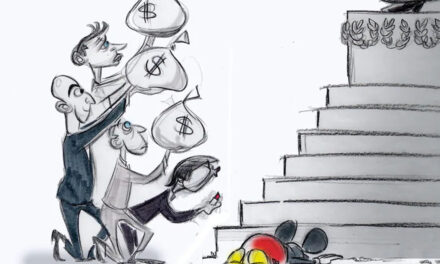
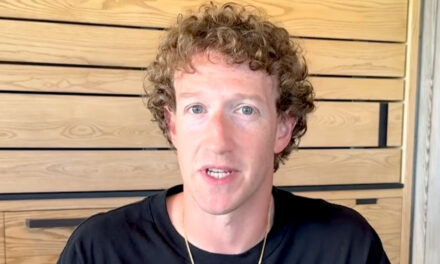
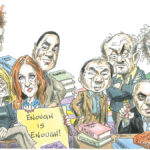

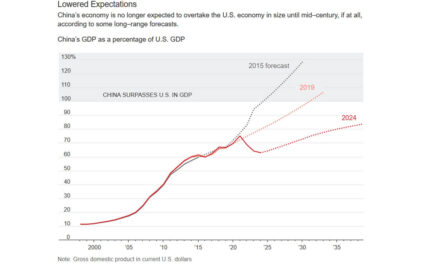
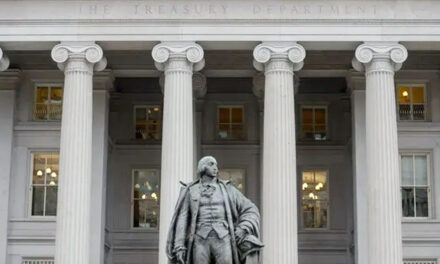






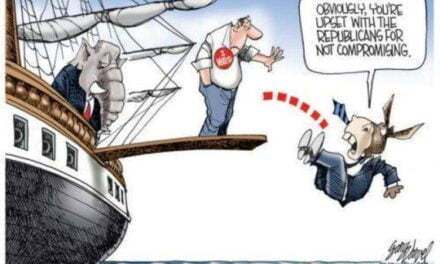

excellent piece.
Very well explained and a eye opener to all that can’t grasp the real reasons for this problem.
Thank you for the great analogy
Growing up in the south, was wonderful, strange to me, when it came to racism! I remember wondering what all the fuss was about?
I know, I didn’t hate anyone, I went to public schools, even though I had the opportunity, to go to private schools! My siblings went to private schools as did I, until I asked my parents to allow me to go to public school, I played baseball and the private school we attended didn’t have sports! I have to say that I experienced racism immediately, only it wasn’t white kids that hated blacks, it was entirely opposite! Black kids were walking around with a chip on their shoulder! I played sports, and the black kids I played ball with didn’t act like that! There were a couple of scrapes, with a couple of hateful-black kids, but all in all, not more than an idiotic, stare down! Then I realized that the kids were only acting on what they heard at home. The dreaded “N” word wasn’t used by my white friends, however it was black kids, calling other black kids, that word! At home we didn’t use that word, why would we? I was brought up in a church going family, and my father was a fireman, my mother a housewife, we didn’t hate anyone! I was born in Memphis,Tn. and I quickly realized that there was pent up rage in the black community, and I didn’t know why. My family didn’t display a rebel flag, we didn’t live in the woods, and we didn’t have a reason to use the “N” word! I remember the Martin Luther King jr. times only because of the news coverage, my father was in the middle of it, but he never discussed work at home, we rode to church during a period, sitting with a shotgun on the back seat! The older I got, the better things got, and that tension was gone, up until the time, Obama came along!
I was going to read over my post, make sure there weren’t misspelled words, but it’s like my post vanished!
He is absolutely correct on this. See it doesn’t make no difference what the color of our skin is we know we all are GOD’s children we are all brothers and sisters and should not judge each other due to the color of skin makes no difference we are all people we have families kids moms dads brothers sisters grandparents we all have love. We all know right from wrong. We Are Americans we can’t let media separate us. This is not what GOD would want. As he loves us all. Thank you Mr. Horist and good luck with your book.
As a white person, I would be a fool to subscribe to any racist attitudes regardless of the color of the persons skin that promotes that racism. Clearly, if all people would shun the racist attitudes of the few who promote their version of racism, we would have a nation with less problems and more success. I cannot allow racism to control my life or actions. I could wish that more minority people would become motivated and get an education and a job and forget the race-baiting we see today by too many who are looked to as leaders. The biggest problem, as I see it, is that too many are looking for freebee’s when they should be looking for a job in an understanding of self responsibility. Race-baiters continually cause hatred and violence, and this leads to unfavorable reactions from and for everyone.. Traditionally, motivated people who hold and act on a personal perception of responsibility, are happier and more successful. Most white people, myself included, would really like to see minorities to be successful and responsible. Not only would they be much more satisfied with their lives but they would be part of the solution and stop being part of the problem.
For a nation* that wishes to preserve itself (and many/ most do, anti-racism not racism** is the scourge- Why? Because, a nation that pursues ant- racist policies will of necessity, demonise and seek to punish/ marginalise / eliminate any of its members who favour other members of their own kind ( fellow members of the nation ); evidently, the pursuit of such a policy will lead to the demise of the nation. Many, particularly among the educated elites in Western Societies feel little or no affinity to, or loyalty towards the nation of which they are members.
For such, the destruction of their nation is welcome; accordingly, they will promote anti- racism policies. For those who wish to preserve their nation it is ant-racism that presents the threat, but note, that does not mean that all forms of racism will be beneficial to any given nation- eg affirmative action and ethnic fast tracking (both racially discriminatory) will be injurious to the nation.
Racism Right or Wrong? The answer to such questions generally depends on the religion prevailing in the nation: mostly a nation’s religion will say that an action harmful to the nation is ‘Bad’ and one Beneficial is ‘Good’. On this basis racism will be judged Good and
anti- racism Bad! Indeed, Racism was not judged Bad in most Western Countries before the ’60’s .
America is a multi-national state and those of its nations that pursue ant- racist policies are likely to disappear long before those that don’t.
* Nation = people sharing a common descent, and frequently a common territory
** Discriminating between people on grounds of their national origin